True or False: 8 POPULAR legends about Fyodor Dostoevsky
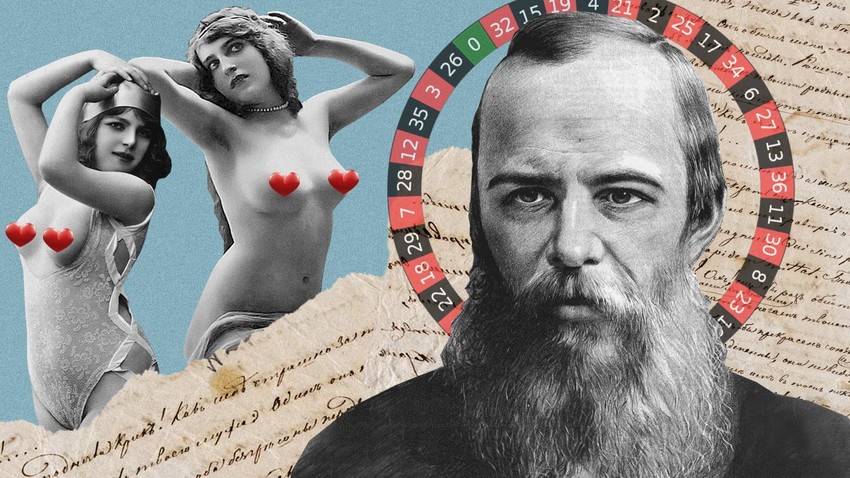
1. Dostoevsky was sexually obsessed and frequented brothels
In literary circles, everyone knew about Dostoevsky’s disorderly sexual relations. The writer himself complained about his promiscuity and his inability to bring it under control and in his youth he visited almost every brothel in St. Petersburg. A letter to his brother in 1845 provides exhaustive evidence: “The Minushkas, Klarushkas, Mariannas etc. are prettier than ever, but they charge crazy money. The other day, Turgenev and Belinsky gave me the most severe scolding for my promiscuous lifestyle.” In Notes from Underground, via the words of his protagonist, Dostoevsky has this to say about himself: “And so, furtively, timidly, in solitude, at night, I indulged in filthy vice, with a feeling of shame which never deserted me.”
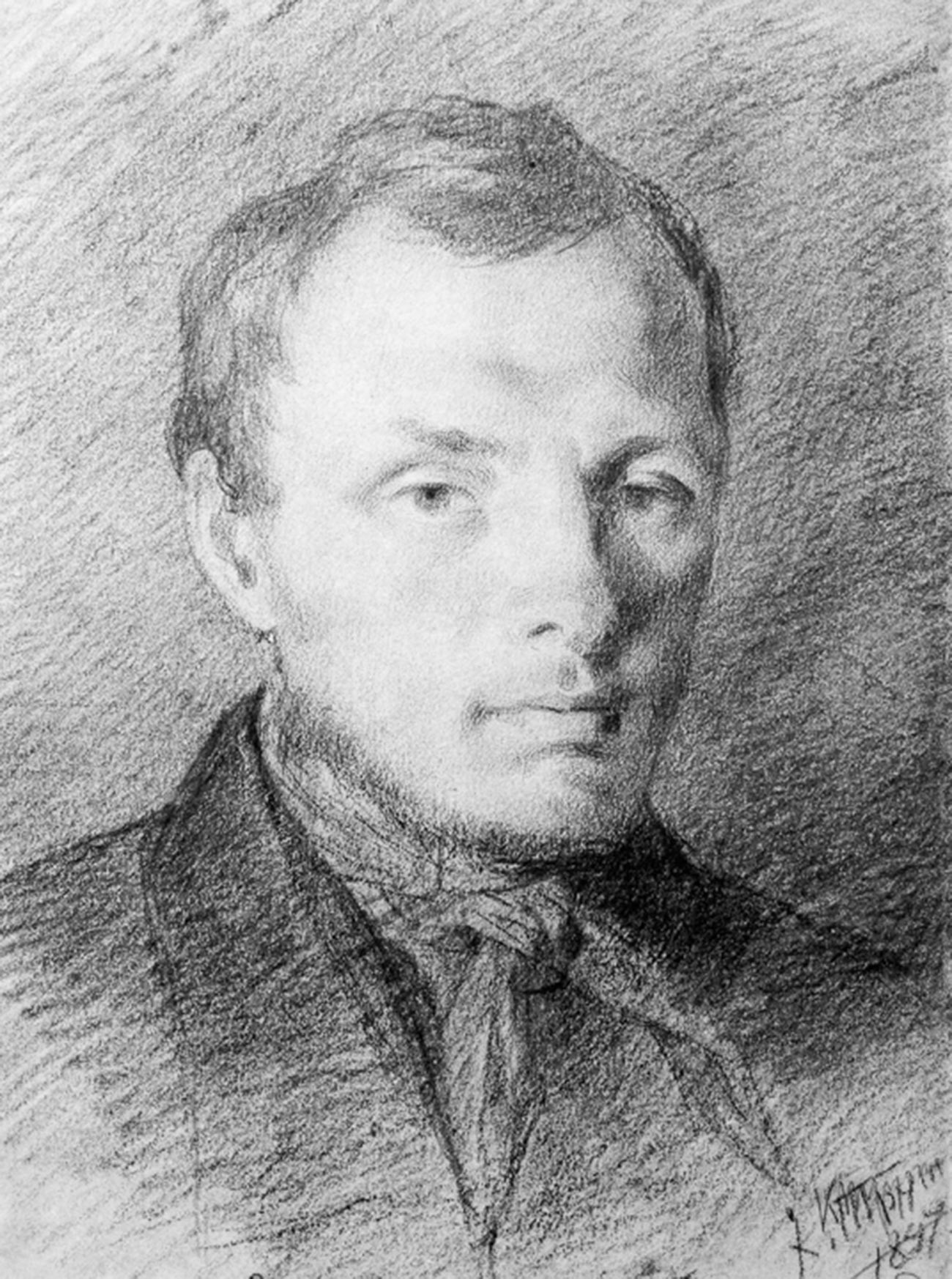
Portrait of Fyodor Mikhailovich Dostoevsky
Konstantin Trutovsky / State Literary MuseumBut he was hopelessly bad at making the acquaintance of women from respectable society: He would instantly become shy and could even faint if a beautiful woman spoke to him. One such incident happened at a high-society gathering when he was introduced to a beautiful woman, after which, according to his friend, the writer Ivan Panaev, Dostoevsky became the target of several mocking four-line epigrams and lampoons. He found things much easier with women whom he could “buy”. This is probably to do with the writer’s sexual preferences - he liked to cause pain and to dominate. Because of this, women whom he had already been with often refused intimacy with him again.
Later, the situation changed somewhat. He got married - twice.
Verdict: True
2: He was bullied in literary circles
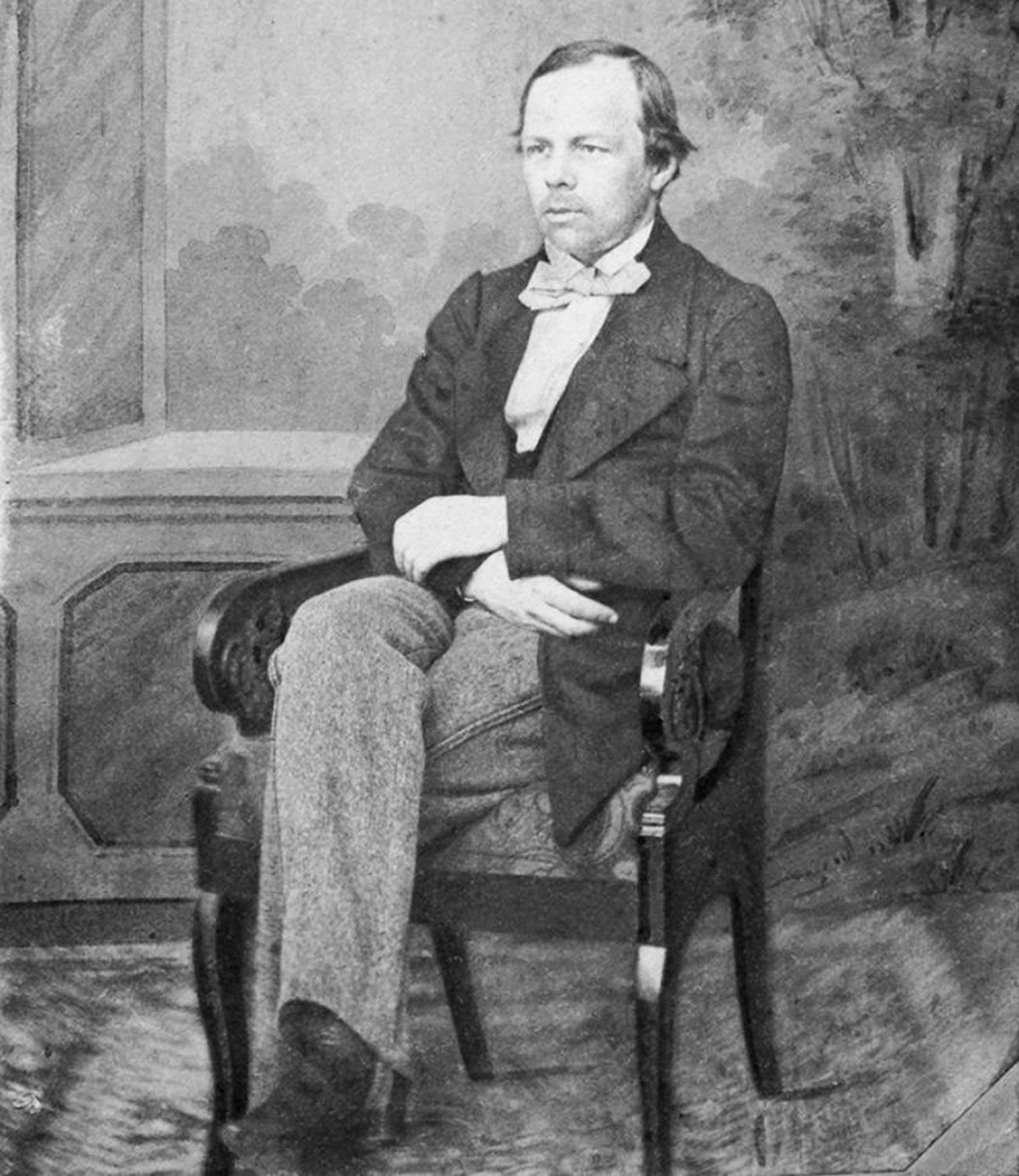
Fyodor Dostoyevsky
Public domain“He was thin and small, had fair hair and an unhealthy complexion,” Avdotya Panaeva, a writer with whom the 25-year-old Dostoevsky was unrequitedly in love, said about him. Dostoevsky, for his part, referred to himself as ‘Quasimodo’. But it was not his appearance, or intellectual and artistic disagreements, that were the cause of constant jibes on the part of his contemporaries and other writers. It was his behavior.
In the literary circles of the time, many perceived him as someone who wrote sentimental pulp fiction and crime stories but, at the same time, considered himself a real genius. He was labeled with epithets like “touchy”, “insecure”, “a real nutcase” and “a pathetically vain individual”. Many writers who knew Dostoevsky didn’t like him and their general complaint was the following: Dostoevsky thinks he is better than other writers and demands special treatment.
Nikolai Nekrasov and Ivan Turgenev nicknamed him an ‘inflamed pimple’ on the nose of literature. Turgenev even spread the rumor that Dostoevsky had allegedly demanded that his novel Poor Folk in the Peterburgsky Sbornik [St. Petersburg Collection] should be highlighted with a gold border. Turgenev invented this, but everyone believed it because it fitted the image of Dostoevsky so perfectly.
Verdict: True
3: Dostoevsky was a pedophile
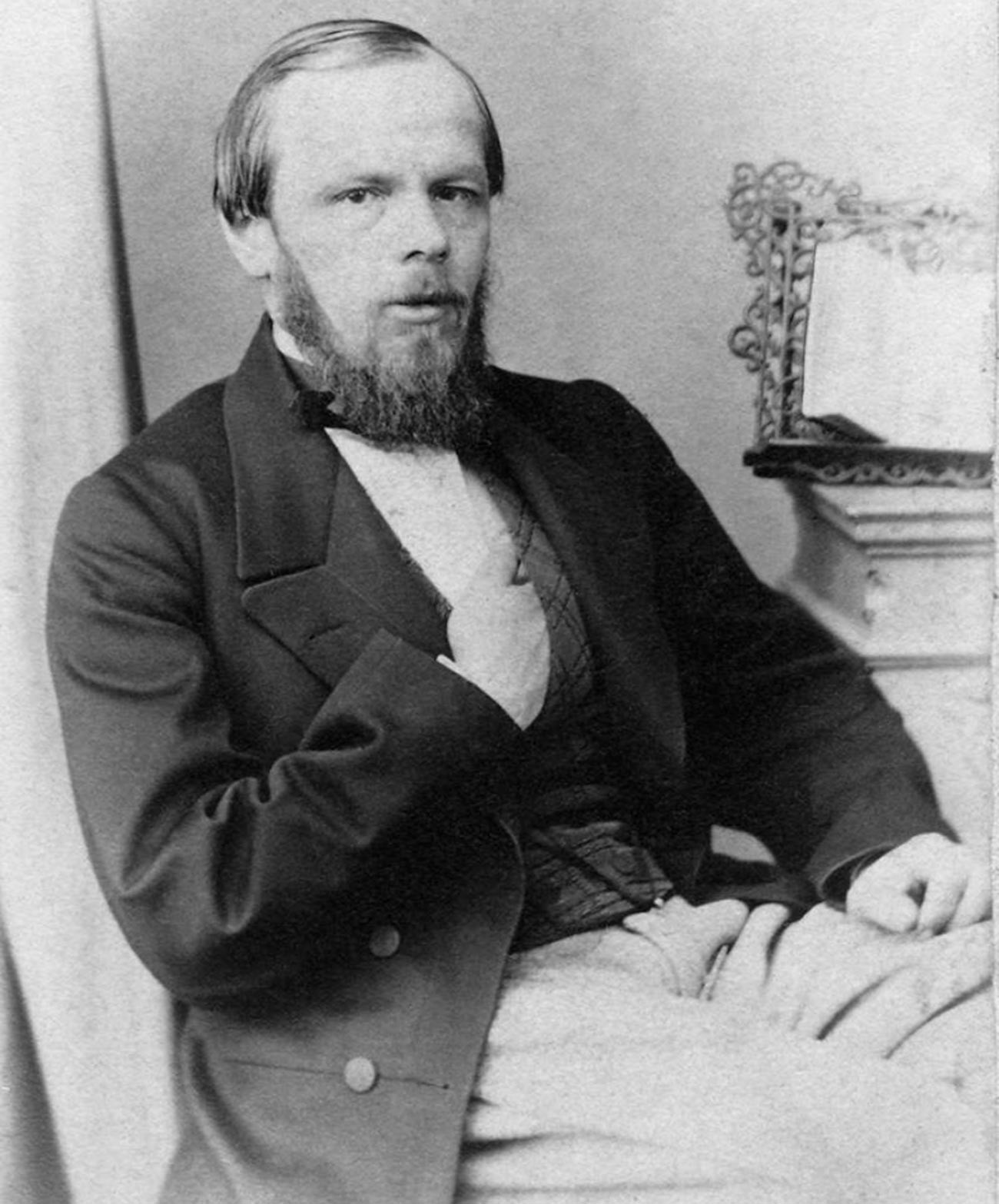
Fyodor Dostoyevsky
I.A. GokhLiterary critic Nikolay Strakhov, who was considered to be a friend of Dostoevsky’s, lamented in a letter to Leo Tolstoy dated November 23, 1883, that he couldn’t write a good review about Dostoevsky, because he knew too many distasteful details about him. “He was drawn to nasty things and boasted about them. Viskovatov started telling me a story about how Dostoevsky boasted to him that he had seduced a little girl in a bathhouse whom her governess had brought to him,” the critic wrote.
Tolstoy did not respond to this in any way. He generally avoided personal acquaintance with Dostoevsky, but rated him highly as a writer. After Dostoevsky’s death, his widow began vehemently to deny the story of his seducing a little girl, pointing out that the episode was in the writer’s drafts for the novel The Devils (The Possessed) - in other words, it was fiction. The rumor, however, was popular for a long time.
Later, it emerged that Strakhov had a motive for tarnishing the writer’s reputation. After Dostoevsky’s death in 1881, Strakhov was invited to sort out his archive and he came across some unflattering comments about himself in Dostoevsky’s notebook. Dostoevsky described him as a man with absolutely no principles, “ready to sell anything and everything”. According to Dostoevsky scholar Liya Rozenblyum, Strakhov realized that, one day, the notebook, as well as Tolstoy’s correspondence, would be published. This is how his plan for long term revenge was hatched - and Strakhov guessed right: Tolstoy’s correspondence was published in the 1910s, while the publication of Dostoevsky’s notebook only took place in the 1970s. For all of 60 years no-one could accuse Strakhov of lying.
Verdict: False
4: He was sentenced to death, but pardoned a couple of minutes before he was due to be executed
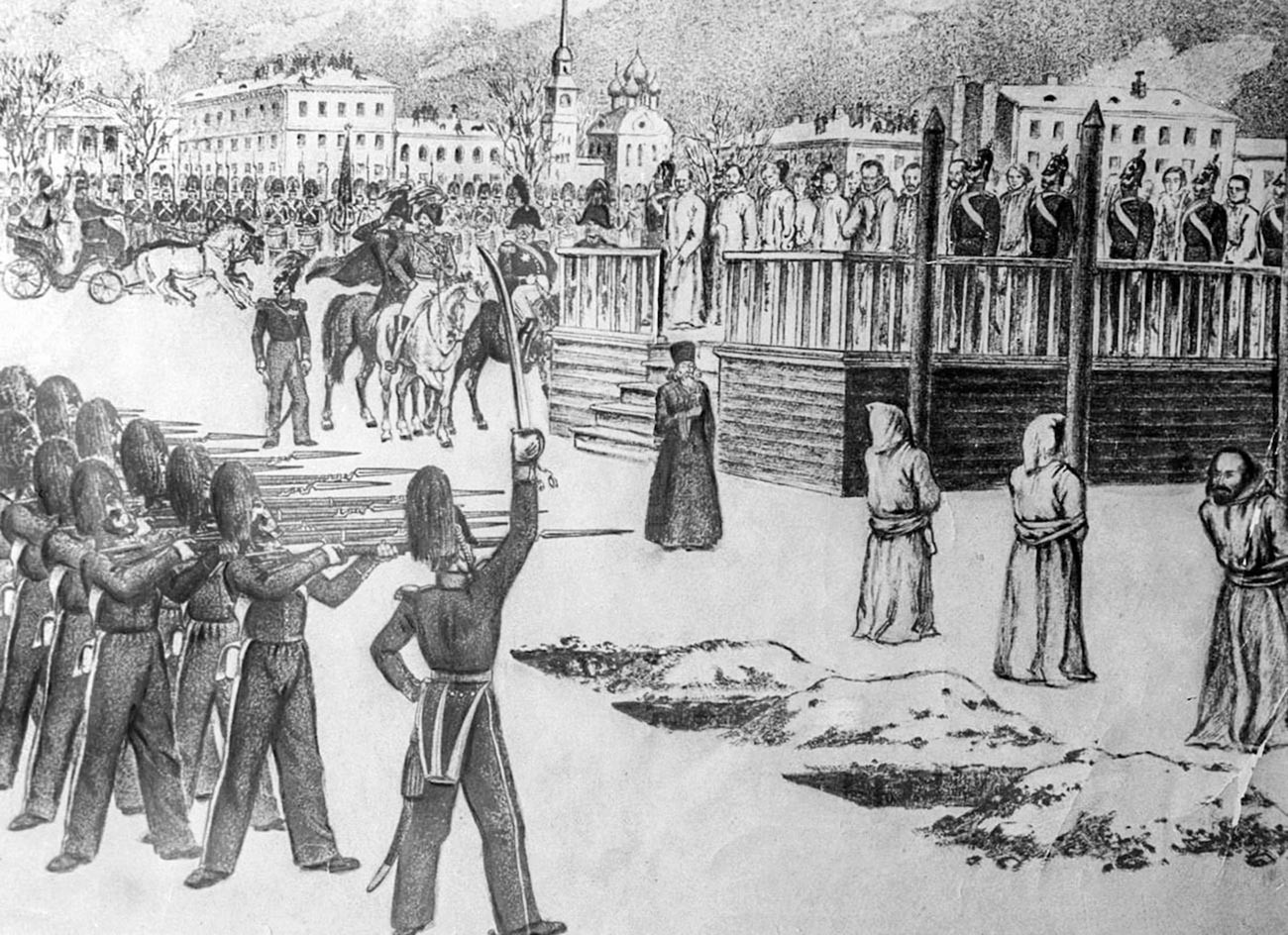
Staged execution
B. PokrovskyIt would be described today as the dissemination of extremist literature calling for the country’s authorities to be toppled. For this, Dostoevsky was sentenced to death along with his fellow plotters.
The young Dostoevsky had been a member of the Petrashevsky Circle (named after the thinker Mikhail Butashevich-Petrashevsky, in whose house meetings of the circle took place). A few of the Petrashevists really did want to carry out a revolution: The majority merely studied and propagated 19th century social utopian ideas (for which they were described as “communists”) and also talked about the disgrace of serfdom, censorship and corrupt officialdom. Many of the Petrashevists were men of letters, writers, scientists and students. But it was the “attempt” to overthrow the authorities that caused the circle to be broken up. Its head was accused of “planning to overthrow the state system” and Dostoevsky and 19 others of disseminating copies of Vissarion Belinsky’s letter to Nikolai Gogol, which was critical of the authorities. In addition, none of them had reported a meeting to the authorities, at which one of the Petrashevists had read out his essay containing recommendations on how to topple the Tsar.
The condemned men were brought to a square for execution by firing squad and they started to be tied to posts in threes. Dostoevsky awaited his turn - he was sixth. But it was all a performance designed to intimidate, because an Imperial pardon and a decision to replace the death penalty with other punishments had already been drawn up. Some of the men had already been blindfolded and the order to take aim had already been given. It was only then that the firing squad was told to stand down. Dostoevsky was later to describe this “near-death” experience in his Diary of a Writer: “Almost all the condemned men were convinced that it [the sentence] was going to be carried out and had to endure at least 10 terrible, immeasurably agonizing minutes expecting to die.”
Verdict: True
5: Dostoevsky hated Jews
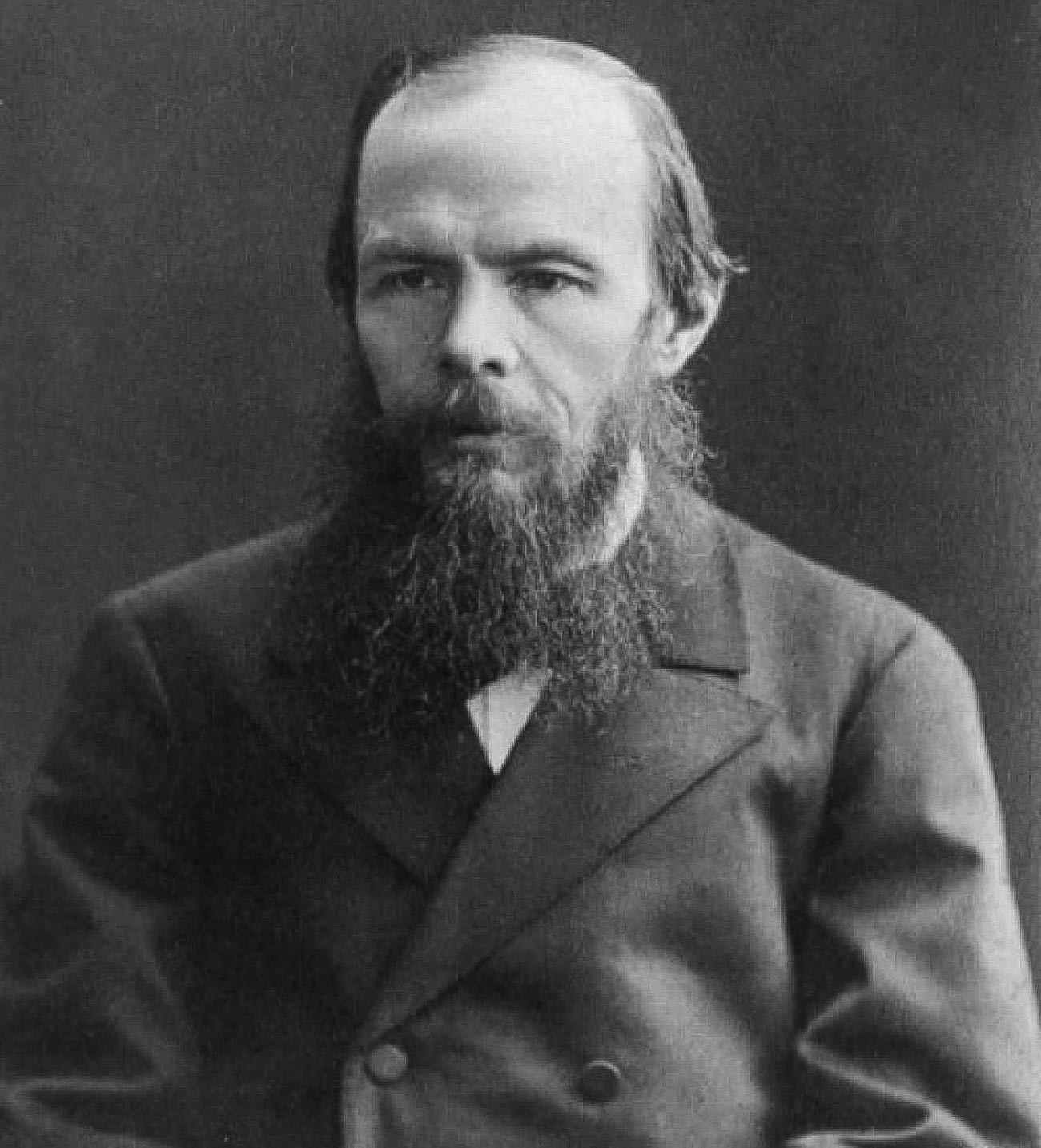
Fyodor Dostoyevsky
Konstantin Shapiro / The National Library of RussiaDostoevsky wrote about the Jews frequently and he summed up his general conclusions in his Diary of a Writer. But because he had a lot of accumulated grievances against the Jews, sometimes expressed in extremely blunt terms, many have categorized him as anti-Semitic. (To be fair, Dostoevsky leveled grievances not just against the Jews, but also the Poles, the French, the Germans and other nationalities, since he only unequivocally held the “godbearing Russian people” in his affection.)
He set out his position in a piece titled The Jewish Question: He was unable to consider the problems of the Jewish people, while too many people in the country found themselves in the same or even worse circumstances. In particular, he had in mind complaints by Jews that they did not have the right of free abode (in the Russian Empire they were only allowed to live in specific areas) at a time when 23 million Russians were serfs and lived in worse conditions. He was resentful of Jewish entrepreneurs, who seized hold of the press and published anti-Russian propaganda and was no less scathing about Russian liberals who “crawled on their knees before the West” and were disparaging about their own country.
He ended the article by wishing for the “full expansion of the rights of the Jewish people”, but on condition that “these rights are adopted and exercised without detriment to the indigenous population”.
In correspondence with the Russian journalist Arkady Kovner, he wrote: “I can tell you that I am not at all an enemy of the Jews and never have been! But the mere fact of their 40-century-old existence, as you put it, demonstrates that it is a people possessed of an extraordinarily vigorous vital force, which, in the course of their entire history, could not but manifest itself in various forms of status in statu [a state within a state].”
Verdict: False
6: He left his dying wife and fled abroad with his mistress
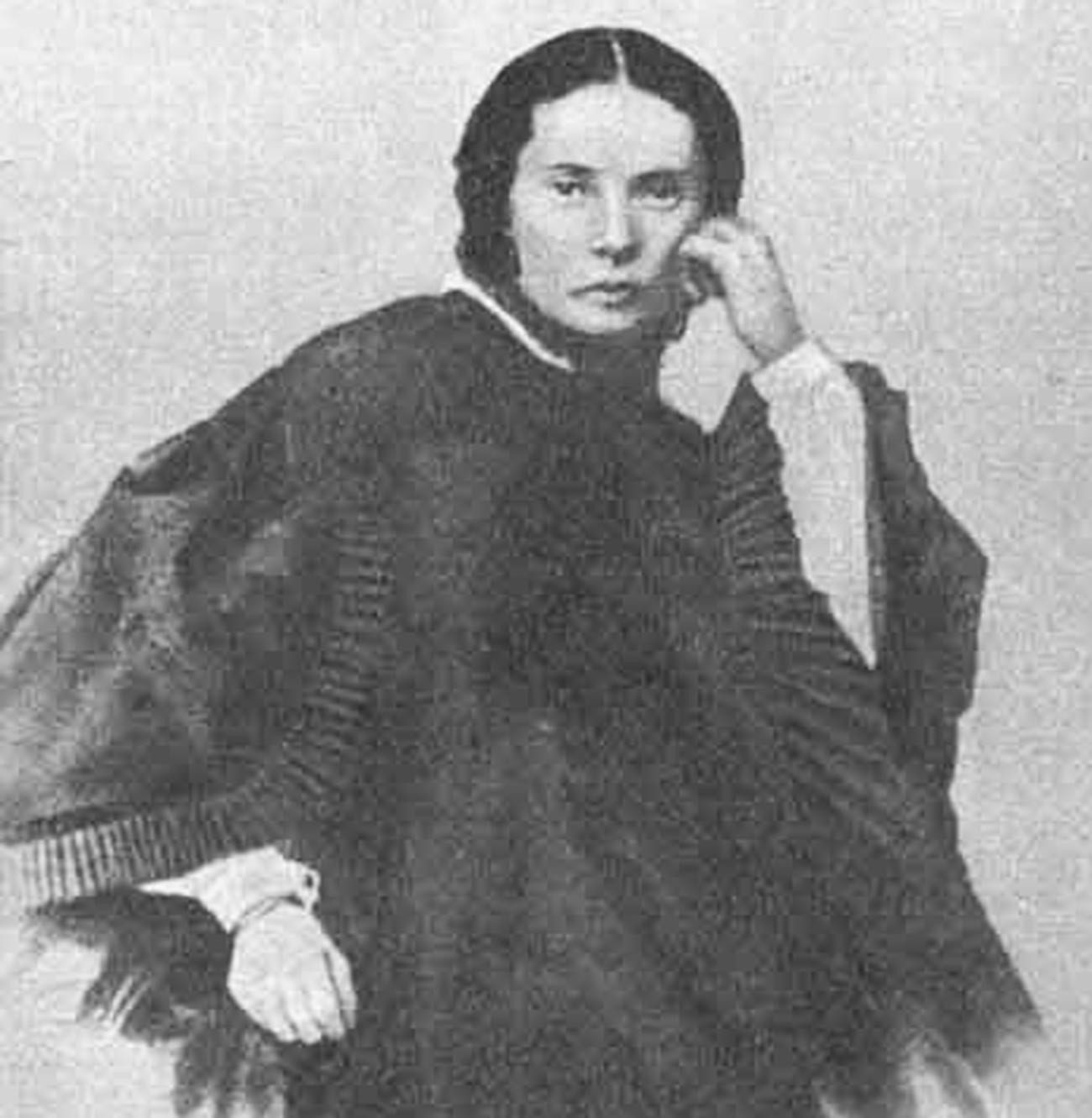
Maria Dostoevskaya
Public domainContemporaries described his first wife, Maria, as a slim, “fairly pretty” blonde, separately noting her “passionate, excitable, lively and impressionable nature”. They married when the writer was 34 and the marriage formally lasted eight years. In practice, however, they did not stay together long: They started living apart almost immediately, not just in different houses but at times in different towns. And each of them had extra-marital attachments.
Their falling out started during their honeymoon when Dostoevsky had an epileptic fit. Until then, doctors had been telling him that he was simply suffering nervous attacks that might pass with a change of lifestyle. This time, the doctor was unequivocal and pronounced a diagnosis of epilepsy (falling sickness). “If I had known for sure that I really had falling sickness, I would not have married,” he later wrote to his brother.
It is true that Dostoevsky set off on his first foreign trip in 1862 without his wife and, at that time, she was already ill with tuberculosis. But, in the 1860s (she died in 1864), he tried all the time to alleviate his wife’s suffering, accompanied her from one town to another to see different doctors, hired carers for her and was with her in her last minutes.
The writer would later admit: “She loved me boundlessly and I also loved her immeasurably, but we did not have a happy life together… She was the most honest, noble-minded and generous-hearted woman I have known in my whole life.”
Verdict: False
7: He was practically a pauper
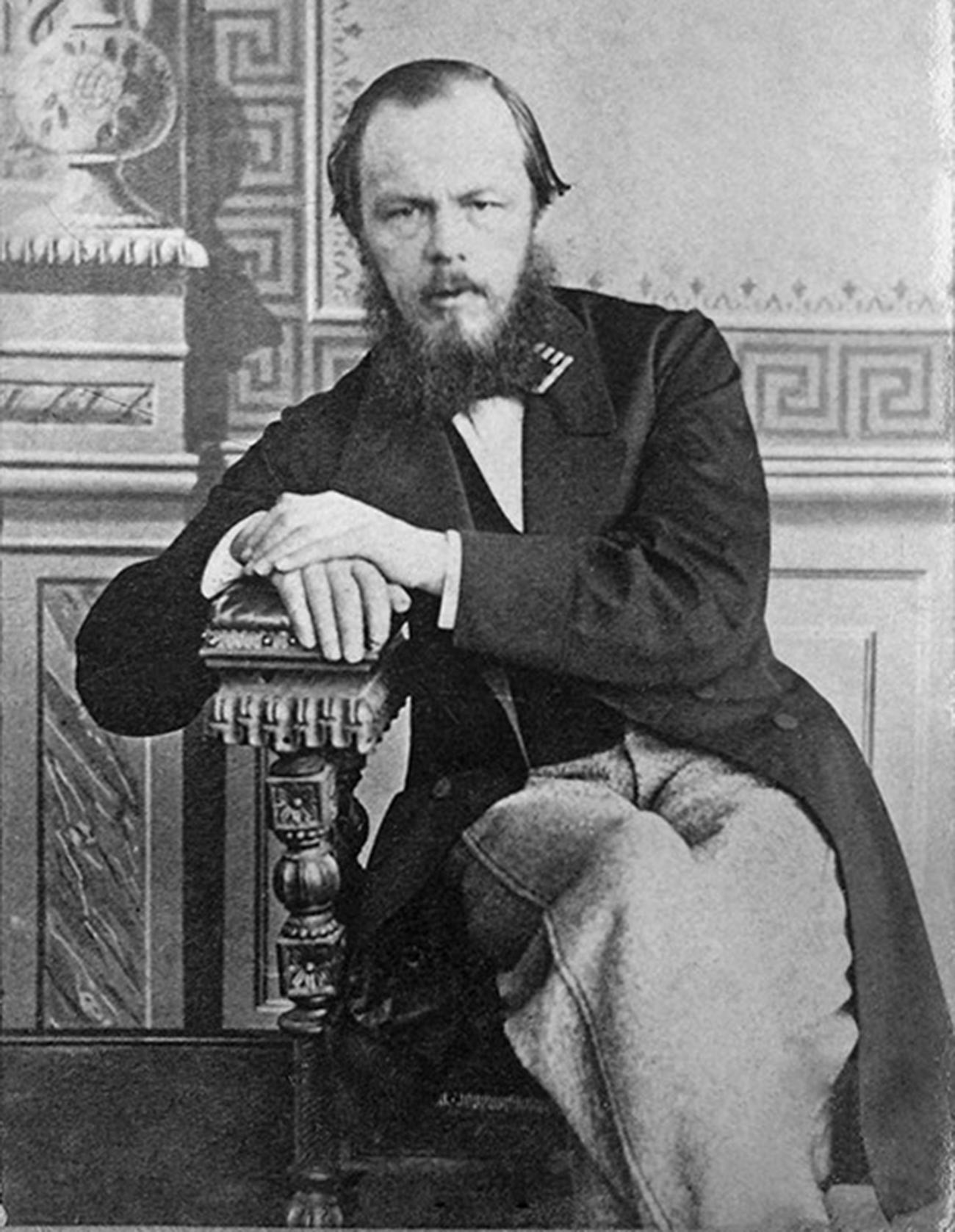
Fyodor Dostoyevsky
A.O. BaumanDostoevsky earned a living primarily from his work as a writer and the royalty payments he received from what he published in magazines were modest. He was quite incapable of earning a living or even putting money aside in a sensible way. In addition, his financial situation was seriously undermined by his gambling addiction.
His finances became particularly dire after the death of his first wife. This was followed by the death of his brother, Mikhail, with whom Dostoevsky had been bringing out the magazine Vremya, the expenditure on which had been substantial. When the magazine was closed down because of a politically compromising article, Fyodor had to sort out all the financial difficulties and debts on his own. At the same time, he continued to gamble (and almost always to lose). When he was already married to his second wife, Anna, he had to sell their wedding rings and her wedding dress when yet another debt instalment needed to be paid.
Verdict: True
8: He wrote a novel in 26 days
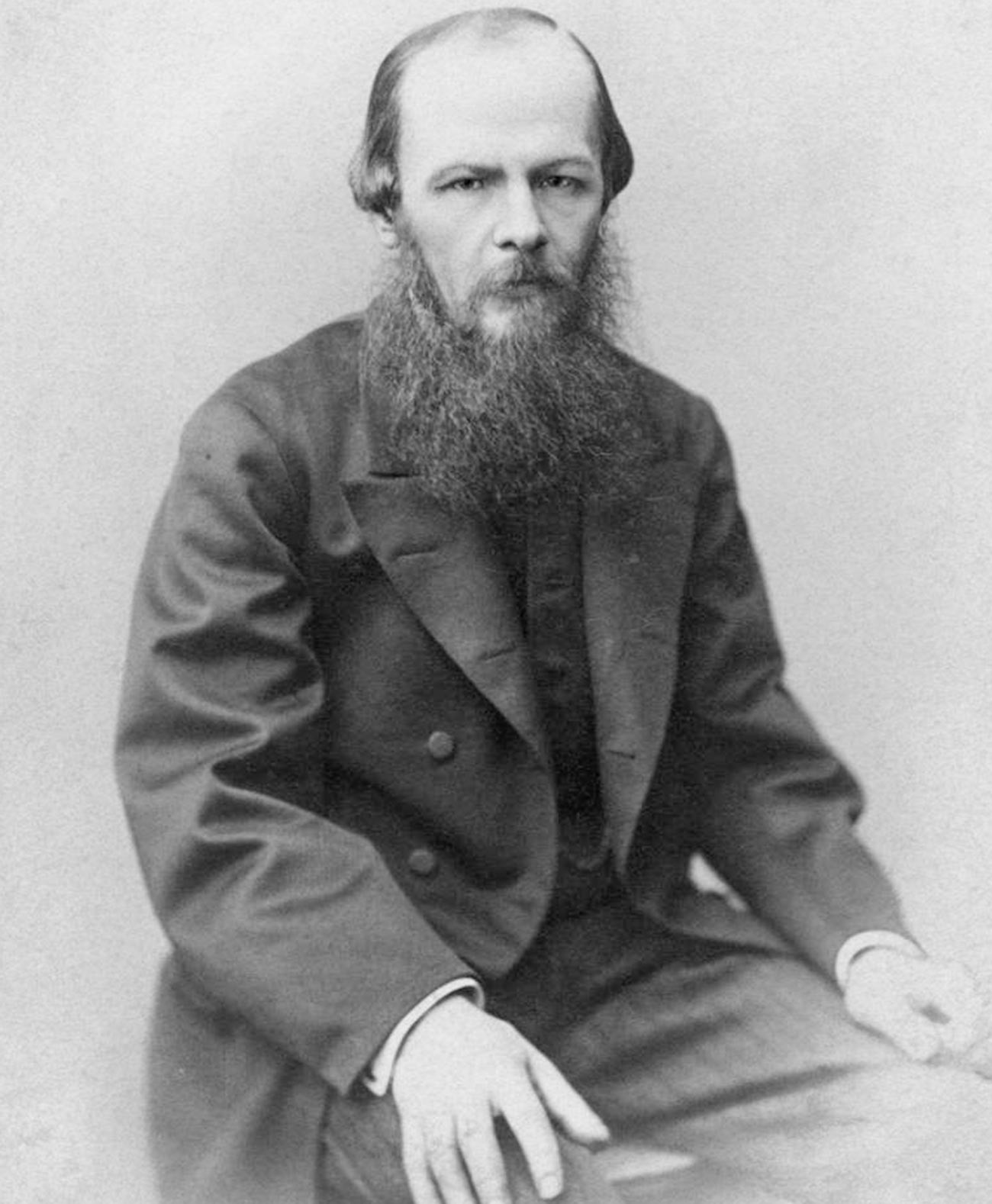
Fyodor Dostoyevsky
V. Ya. LauffertPoverty drove the writer to adopt extreme measures. In 1866, in order to secure an advance payment, he signed a contract with the publisher Fyodor Stellovsky on truly onerous terms. The contract obliged him to write a new novel for Stellovsky by November 1 that year. If the writer failed to meet the deadline, all the rights to any works written by him in the subsequent nine years would pass to Stellovsky, who could publish them where and how he wanted without paying any royalties to Dostoevsky.
The work proceeded badly and the epileptic fits sparked by his nervous state got worse. In the end, Dostoevsky hired a stenographer, to whom he dictated the novel. She was 20-year-old Anna Snitkina (his future second wife). The two of them worked together on the 400-page novel, The Gambler - devoted to a theme that tormented the writer most of all at that time. And they wrote it in just 26 days, finishing it three days before the allotted deadline.
Verdict: True
If using any of Russia Beyond's content, partly or in full, always provide an active hyperlink to the original material.
Subscribe
to our newsletter!
Get the week's best stories straight to your inbox